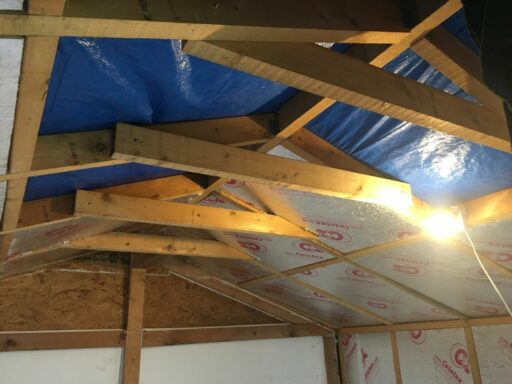In the quest for a cozy, energy-efficient home, insulation emerges as a critical component. ‘Crafting Comfort: A Look at Leading Insulation Contractors’ delves into the intricate world of insulation installation, providing homeowners with the insights needed to make informed decisions. This article navigates through various facets of the insulation industry, from the selection of materials and contractors to the financial implications and comprehensive services offered. It aims to equip readers with the knowledge to enhance their home’s comfort and efficiency through professional insulation services.
Key Takeaways
- Selecting the right insulation material is crucial for energy efficiency and comfort, with options ranging from traditional fiberglass to innovative eco-friendly solutions.
- It’s essential to assess the expertise of insulation contractors, ensuring they have the necessary experience, certifications, and a portfolio of successfully completed projects.
- Licensing and insurance are non-negotiable when choosing a contractor to guarantee safety and accountability during the insulation process.
- Energy efficiency isn’t just about the immediate comfort; it’s an investment that yields long-term savings and contributes to a sustainable future.
- Comprehensive insulation services should encompass a full spectrum of support, from initial consultation and installation to post-installation maintenance and energy management advice.
Navigating the Insulation Installation Landscape

Understanding Different Insulation Materials
When it comes to insulating your home, the material you choose is crucial for ensuring energy efficiency and comfort. Different insulation materials cater to various needs and building specifications. For instance, fiberglass insulation is common due to its cost-effectiveness and thermal resistance. Cellulose insulation, often made from recycled paper, is favored for its eco-friendliness and ease of installation in tight spaces.
Another option is polyisocyanurate insulation, which offers high R-value per inch, making it ideal for areas with space limitations. Expanded polystyrene and extruded polystyrene are both forms of foam board that provide excellent thermal insulation and moisture resistance. Spray polyurethane foam expands to fill gaps, offering an airtight seal, while radiant barriers reflect heat, reducing summer heat gain.
Choosing the right insulation material can significantly impact your home’s energy consumption and overall comfort. It’s essential to consider factors such as R-value, moisture resistance, and environmental impact when selecting an insulation type.
Understanding the properties and benefits of each insulation type is key to making an informed decision. Here’s a quick overview of some popular materials:
- Fiberglass Insulation: Inexpensive and widely available.
- Cellulose Insulation: Eco-friendly with good soundproofing qualities.
- Polyisocyanurate Insulation: High R-value for superior thermal resistance.
- Expanded Polystyrene: Lightweight and easy to handle.
- Extruded Polystyrene: High moisture resistance, suitable for below-grade applications.
- Spray Polyurethane Foam: Provides an airtight seal, excellent for irregular spaces.
- Radiant Barriers: Effective in hot climates to reduce cooling costs.
Assessing Insulation Contractors’ Expertise
When selecting an insulation contractor, it’s crucial to evaluate their level of expertise and the quality of their work. A contractor’s experience with specific insulation materials and project types can greatly influence the outcome of your installation. Here are some steps to consider:
- Verify the contractor’s experience and expertise, particularly in the type of insulation you require.
- Inquire about their track record with projects similar to yours and request examples of past work.
- Ensure the contractor is licensed and certified, which indicates a commitment to industry standards and professionalism.
It’s essential to protect yourself by choosing a contractor who is adequately insured for unexpected issues during installation.
Additionally, consider the contractor’s approach to unforeseen challenges and their ability to provide comprehensive solutions. By assessing these factors, you can select a contractor who will deliver quality workmanship and contribute to the longevity and efficiency of your insulation.
Importance of Licensing and Insurance
When selecting an insulation contractor, the importance of licensing and insurance cannot be overstated. These credentials are not just formalities; they are essential protections for both the homeowner and the service provider. A licensed contractor has been vetted for knowledge and adherence to building codes, while insurance covers potential damages or accidents during the project.
- Licensing: Verifies professional qualifications and legal authorization to perform insulation services.
- Insurance: Provides coverage for property damage, bodily injury, and other liabilities, safeguarding all parties involved.
Ensuring that your chosen contractor is fully licensed and insured is a critical step in the hiring process. It’s a layer of security that protects your investment and provides recourse in the event of substandard work or unforeseen issues.
Always confirm the contractor’s credentials with the appropriate regulatory bodies and understand the extent of their insurance coverage. This due diligence is a cornerstone of a successful insulation project.
Maximizing Energy Efficiency with Professional Insulation

The Role of Energy Management in Insulation
Effective energy management is pivotal in the realm of insulation, as it directly influences a building’s thermal performance and energy consumption. High-performance insulation is a cornerstone of energy-efficient buildings, significantly reducing the need for heating and cooling. This not only leads to lower utility bills but also contributes to a more sustainable environment.
- Understanding the thermal properties of insulation materials
- Assessing the energy efficiency of different insulation types
- Implementing insulation solutions that cater to specific climatic conditions
By optimizing insulation, homeowners and businesses can achieve substantial energy savings over time. It’s essential to select insulation that aligns with both the environmental conditions and the energy goals of the property.
When considering insulation contractors, it’s crucial to evaluate their expertise in energy management and their ability to provide solutions that enhance the overall energy efficiency of a building. The right insulation can make a significant difference in the energy savings and comfort levels of a space.
Innovations in Insulation Techniques
The landscape of insulation is rapidly evolving, with next-generation insulation techniques emerging as game-changers in energy-efficient construction. These innovations range from advanced materials that offer superior heat retention to smart systems that adapt to environmental conditions.
- Aerogel Insulation: Boasting high R-values, aerogel is one of the lightest and most effective insulators known today.
- Vacuum Insulation Panels (VIPs): Offering excellent thermal resistance, VIPs are ideal for space-constrained applications.
- Phase-Change Materials (PCMs): PCMs absorb and release thermal energy, maintaining comfortable indoor temperatures.
- Spray Foam with Bio-based Ingredients: A sustainable option that reduces reliance on fossil fuels.
Embracing these cutting-edge techniques not only enhances the thermal efficiency of buildings but also contributes to a more sustainable future in construction.
Contractors who stay abreast of these trends and incorporate them into their services can provide significant value to their clients, ensuring that the insulation not only meets current standards but is also prepared for future advancements.
Selecting Contractors with Green Building Expertise
When embarking on an insulation project, selecting a contractor with green building expertise is not just a preference but a strategic move towards sustainability. Contractors with a strong background in green building practices are more likely to use eco-friendly materials and energy-efficient methods, ensuring that your insulation contributes to a healthier environment both inside and outside your home.
- Look for contractors who are well-versed in the latest green building certifications and standards.
- Assess their portfolio for past projects that have incorporated green building techniques.
- Verify their commitment to sustainability through memberships in green building communities and trade groups.
It’s essential to partner with a contractor who not only understands the technical aspects of insulation but also values the impact of their work on the planet. This alignment with green building principles can lead to long-term energy savings and a reduced carbon footprint.
Finally, don’t forget to evaluate the contractor’s track record through customer reviews and feedback, focusing on their ability to deliver projects that meet green building criteria. This due diligence will ensure that your insulation contractor is not only skilled but also shares your commitment to environmental stewardship.
Ensuring Quality and Safety in Insulation Services

Workmanship Warranty: Your Safety Net
A workmanship warranty acts as your safety net, providing assurance that any defects in installation will be addressed by the insulation contractor. This warranty is crucial for protecting your investment and ensuring that any potential issues are rectified without additional costs to you.
When evaluating a contractor’s warranty, consider the following points:
- Duration of the warranty period
- Scope of coverage (workmanship, materials, or both)
- Process for filing a warranty claim
- Transferability of the warranty to future property owners
It’s essential to have a clear understanding of the warranty terms to avoid any surprises down the line. A comprehensive warranty can significantly influence your decision when selecting a contractor.
Always verify the specifics of the warranty offered and ensure that it is included in the contract. A reputable contractor will be transparent about their warranty policy and willing to discuss the details with you.
Trade Group Memberships and Certifications
Membership in reputable trade groups and the acquisition of professional certifications are hallmarks of a distinguished insulation contractor. These affiliations not only demonstrate a commitment to industry standards but also ensure that contractors are up-to-date with the latest advancements and ethical practices.
Trade groups such as the American Concrete Pavement Association (ACPA) and the American Society of Concrete Contractors (ASCC) set the bar for professional excellence. They offer certifications that validate a contractor’s adherence to best practices and quality standards.
- Membership in trade organizations
- Professional certifications
- Adherence to industry standards
- Access to the latest industry advancements
When selecting an insulation contractor, verifying their trade group memberships and certifications can provide peace of mind that you are choosing a professional who is recognized for their expertise and reliability.
Warranties offered by contractors can complement these credentials, indicating a robust commitment to quality and customer satisfaction. It’s advisable to inquire about both material and labor warranties, as a comprehensive warranty package is a strong indicator of a contractor’s confidence in their workmanship.
Evaluating Customer Reviews and Feedback
In the digital age, customer reviews are a goldmine of information for assessing the reliability and quality of insulation contractors. Reviews on the company’s website, social media, and platforms like Yelp or Google Reviews can provide a snapshot of customer satisfaction and service quality.
When examining reviews, consider the following:
- The level of detail in the feedback
- The number of reviews and overall ratings
- Specific mentions of the quality of materials and installation process
- The balance of positive and negative reviews to detect any bias
Remember, while customer reviews can be enlightening, they should be one of many factors in your decision-making process. Always cross-reference with other sources to ensure a comprehensive evaluation.
A structured approach to analyzing reviews can reveal patterns that speak to the contractor’s expertise and professionalism. For instance, a high volume of positive reviews typically correlates with a company’s ability to meet or exceed customer expectations. However, be wary of the occasional biased or fake review, and seek a well-rounded view by reading across multiple platforms.
The Financial Aspects of Insulating Your Property

Comparing Quotes: Balancing Cost and Quality
When insulating your property, receiving multiple quotes is a critical step. Do not let the price tag alone dictate your choice; instead, focus on the value offered. A low quote might be tempting, but it could also signal subpar materials or workmanship. Conversely, the highest quote does not guarantee the best service. Aim to strike a balance between cost and quality by considering the following points:
- Experience and Reputation: Evaluate the contractor’s track record and the quality of their previous work.
- Materials Used: Ensure that high-quality materials are proposed in the quote.
- Scope of Work: Review what is included in the price, such as additional services or warranties.
- Licensing and Insurance: Confirm that the contractor meets all legal requirements and is insured.
Remember, the goal is to achieve long-term savings through energy efficiency, not just to minimize the upfront cost. Quality insulation can reduce energy bills significantly over time, making it a wise investment.
Finally, ask questions and seek clarity on any aspect of the quote that seems unclear. A trustworthy contractor will be transparent and willing to discuss the details of their quote.
Understanding the Long-Term Savings of Insulation
Investing in quality insulation for your property is not just about immediate comfort; it’s a strategic financial decision with long-term savings. Proper insulation reduces the need for heating and cooling, leading to significant energy cost reductions over time. For instance, a well-insulated roof can prevent heat loss in the winter and keep your home cooler in the summer, directly impacting your utility bills.
The longevity of insulation materials also plays a crucial role in financial savings. Some materials, like certain foams or fiberglass, can last for decades, minimizing the need for frequent replacements. This durability translates to less frequent expenditures and more money kept in your pocket.
By choosing the right insulation contractor, you ensure adherence to codes and regulations, which is essential for successful home remodeling and construction projects. A professional installation guarantees that insulation is effective and compliant, avoiding costly penalties or adjustments down the line.
Here’s a quick look at the potential savings:
| Year | Estimated Energy Savings |
|---|---|
| 1 | $200 – $400 |
| 5 | $1,000 – $2,000 |
| 10 | $2,000 – $4,000 |
Remember, these figures are estimates and actual savings will vary based on the size of your property, the climate you live in, and the quality of the insulation installed. Nonetheless, the pattern is clear: the initial investment in insulation pays off handsomely over time.
Financing Options for Insulation Projects
Exploring financing options for insulation projects is crucial for homeowners looking to improve their property’s energy efficiency without a hefty upfront cost. Various financing avenues are available, ranging from traditional home improvement loans to more innovative green financing programs.
Homeowners should compare options to find the most suitable financial solution. For instance, the title ‘Best Home Improvement Loans of March 2024 – NerdWallet’ suggests a comparison of different lenders. It’s important to weigh the pros and cons of each option, including interest rates, repayment terms, and any additional fees.
- Traditional Home Improvement Loans
- Green Energy Loans
- Home Equity Lines of Credit (HELOC)
- Government-Backed Incentives
Financing insulation projects not only makes the upgrade more accessible but also contributes to long-term savings on energy costs. It’s an investment that pays back over time, both in monetary savings and environmental impact.
Comprehensive Services Offered by Insulation Contractors

From Consultation to Installation: A Full Spectrum of Services
Leading insulation contractors offer more than just installation; they provide a comprehensive suite of services to ensure your insulation needs are fully met. From initial consultation to the final installation, clients can expect a seamless experience tailored to their specific requirements.
- Consultation: Understanding your needs and proposing solutions.
- Design: Crafting a plan that maximizes efficiency and comfort.
- Material Selection: Choosing the right insulation for your property.
- Installation: Professional and precise implementation.
- Quality Check: Ensuring everything is up to standard.
- Aftercare: Providing support and maintenance advice.
The right contractor will not only guide you through the selection of materials and the intricacies of installation but will also stand by their work with post-installation support and maintenance advice.
It’s crucial to partner with a contractor that offers a full spectrum of services, as this can significantly impact the effectiveness and longevity of your insulation. A contractor’s ability to offer additional services such as energy audits, legal services, and environmental diagnostics can be a testament to their expertise and commitment to delivering a comprehensive insulation solution.
Additional Services: Beyond Insulation
Leading insulation contractors often provide a suite of additional services to complement their core offerings. These services not only enhance the overall energy efficiency of a property but also address a range of home improvement needs. Comprehensive service providers can become a one-stop shop for homeowners, ensuring that all aspects of a property’s performance and aesthetics are expertly handled.
- Cabinetry
- Cleaning Services
- Consulting
- Design and Development
- Electric and Engineering Services
- Environmental Diagnostics
- Facilities and Financial Management
- Flooring and Geothermal Solutions
- Heating, Ventilation, and Air Quality
- Interior Design and Landscape Services
- Legal Services
- Masonry, Drywall, and Millwork
By offering these additional services, contractors can deliver a holistic approach to home improvement, which can significantly streamline the renovation process for homeowners.
It’s important for clients to understand the breadth of services offered by their insulation contractor. This knowledge can lead to more efficient project management and potentially lower overall costs, as multiple services can be bundled together under a single provider.
Maintaining Insulation: Post-Installation Support
After the installation of insulation, the journey to a more energy-efficient home continues. Regular maintenance is crucial to ensure the insulation performs optimally over time. Homeowners should schedule periodic inspections with their contractors to identify any areas that may need attention.
- Annual Inspections: To prevent degradation and spot potential issues, an annual check-up by a professional is recommended.
- Addressing Repairs: If damage or wear is detected, timely repairs can prevent further issues and maintain insulation effectiveness.
- Upgrades: As technology advances, consider upgrading to newer insulation materials that offer better performance.
Maintaining a strong relationship with your insulation contractor can lead to extended support and advice on keeping your insulation in top condition. This partnership is invaluable for the longevity and efficiency of your home’s insulation system.
Conclusion
In the quest for a comfortable and energy-efficient home, the role of insulation contractors cannot be overstated. From the vast array of services they offer, including energy management, HVAC solutions, and specialized installations for various home improvement areas, to the critical importance of licensing, insurance, and workmanship warranties, homeowners have much to consider. The insights provided on the proficiency with different materials, customer reviews, and trade group memberships further equip readers to make informed decisions. As we conclude this exploration of leading insulation contractors, it’s clear that the right choice not only enhances home comfort but also contributes to long-term savings and sustainability. Remember to compare quotes, verify insurance, and prioritize safety and quality to ensure your home is in skilled hands.
Frequently Asked Questions
What should I look for to ensure an insulation contractor is properly licensed and insured?
Check that the contractor has valid licenses to operate in your area and carries comprehensive liability insurance and workers’ compensation. This protects you from liability in the event of accidents or property damage.
How important is a workmanship warranty when choosing an insulation contractor?
A workmanship warranty is crucial as it ensures that any installation issues will be addressed by the installer at no additional cost, providing peace of mind and long-term value.
What are the benefits of hiring a contractor with green building expertise for insulation?
Contractors with green building expertise can provide energy-efficient insulation solutions that reduce your carbon footprint and can lead to significant energy savings over time.
How can I compare quotes from insulation contractors effectively?
Gather at least three quotes, compare the details of the services offered, the materials used, and the total costs. Look beyond price to consider the contractor’s reputation, expertise, and warranty offerings.
Why is it important to read customer reviews and feedback before hiring an insulation contractor?
Customer reviews can provide insights into the contractor’s reliability, quality of work, communication style, and ability to meet deadlines, helping you make a more informed decision.
Are there any financing options available for insulation projects?
Many contractors offer financing plans or can recommend third-party financial services. Additionally, government incentives or rebates for energy-efficient upgrades may be available to help offset costs.





